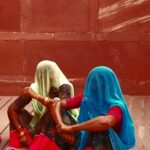On a wooden bench in the abandoned society park, he sat fanning himself with one hand while the other caressed the twitching cat that kept bunting against his fingers. His frightening voice, heavy with hope, asked Gul, “Did you find any paper in your schoolbag’s top zip today?” For her thoughts, ahorse and ready to ride the voice, his question fired a gunshot. “You?” Gul rushed back. His head nodded—up, down, up, down—then quickly turned toward the cat. “I could not read it,” she said. “Do you remember the festival Chitrani we learned about in today’s culture studies period?” she asked. Before his eyes merely shrank as he tried to recall, she continued, “I have heard my dad mention that festival several times when he tells stories from his childhood.” Restless she looked, left in a hurry, bidding him a quick bye, “I am sorry, I have to leave.”
Unlike every other day, when her reluctance to return to the apartment from the park made everything along the way visible—an ant trekking through the grass, the guard who watched her as if he knew all her secrets, the elevator buttons (not just for her floor but every floor), and her own feet approaching the apartment—today, she moved as if nothing existed in between. Everything was invisibilized by the chaos of her thoughts. Shoving the door aside as if it were an obstacle, Gul rushed to her father, who was listening to a song. “Tell me about Chitrani,” she asked, breathless. Her father looked at her with a taunting smile. “But…” Gul, anticipating a useless lecture and question that would only delay the answers she desperately wanted, cut in, “No, no questions. Please. Isn’t it this week?” “Yes,” replied her father. “Okay. I have a request. Can we go to your hometown to celebrate this?” Gul asked, then added quickly, unwilling to entertain refusal, “Please do not say no.” “I am glad you are interested in Chitrani. I will have to make some arrangements, but I promise we’ll go,” her father replied, an unusual excitement in his voice.
Until the day arrived when Gul and her father headed to the airport to attend the Chitrani festival in Hiraeth, Gul remained almost cut off from her surroundings and friends, burying herself in research about the festival online. By the time they left, she was convinced she knew every ritual. “It was really hard to commute to Hiraeth, especially for Chitrani, twenty years ago,” her father said, gazing at the distant airport from the car window. It was just a few hours before they landed in Hiraeth. The moment they stepped outside the airport’s arrival gate, a voice shouted from a crowd of happy faces waiting for their loved ones—“Gul…!” Both turned toward the sound, scanning the crowd to spot the source. “Ah! He is there, in the sky-blue shirt,” said Gul’s father, pointing at a man waving at them. Before he could finish, Gul cut in, “Dad, that’s aqua blue.”
As their car crept through the decked-up market, it moved as if taking one step at a time, constantly blocked by people crossing the road with heavy bags in their hands. The shouts of shopkeepers at their staff pierced through the closed car windows. Gul, spotting a packet in a stranger’s hand, asked curiously—half sure already—“Is that sugarcane?” “Yes,” replied her father. “But the pictures I saw of the festival showed longer ones, with leaves,” Gul said, disappointed and confused. Before her father could respond, the man accompanying them intervened, “Earlier, we used to grow sugarcane in our own fields—so much of it that even after weeks of chewing on sweet stalks after Chitrani, we could never finish it all. But now, everything has changed. Sugarcane farming has become a privilege, reserved only for those who can afford the challenges: less rain, high transport costs, plummeting prices. And even if everything goes right, there are barely any factories left to buy the harvest for sugar production. So now, we just buy it for tradition.” “But it is not too expensive,” he continued, his tone shifting from nostalgia to resigned comfort. “You get four pieces in a packet for 499 rupees. That’s not bad, I think.” The villages streamed past the car window like pages of a forgotten album, stirring in Gul fascination, shock, and curiosity. Between her father’s recollections and the stories of the man driving the car—each slicing through decades of personal and cultural memory—words ate the distance during their journey from the airport to Gul’s father’s ancestral home.
It was Gul’s first time visiting Hiraeth. “It doesn’t look like a village,” she murmured, standing on the rooftop beside her father. Her eyes darted around, searching for something familiar. She turned to him and continued, “You said it was a village.” “Yes, it is,” her father replied. “But there are hardly any cattle or mud houses,” Gul remarked, her eyebrows contracted in disbelief and voice laced with doubt. Her father answered with pride, “Now they have money. There are a lot of facilities. Almost all the houses have ACs. There are good…” “Then why do we live in the city?” Gul interrupted, curiosity sharp in her tone. “Because cities have better facilities,” her father replied without hesitation. “But you are saying Hiraeth has all the facilities too,” Gul countered. “No, Cities are still better in facilities. It is true Hiraeth has developed over time, but it is not enough to be called a city, yet not quite a village anymore.” “It has no identity,” he continued, thinking out loud. “Or maybe its identity lies in the transition.” He paused, then looked at his watch. “Leave it… It is already 10. Dinner is waiting. Let’s eat and sleep early. Tomorrow is the day we came for. You must be excited for Chitrani, right? It’s your first time, after all.” Her father’s words lingered in the still and peaceful night as Gul leaned against the rooftop boundary, listening. Only the distant festival music floated to their ears, fluctuating as the air swayed. “At least the air is not that polluted,” said Gul as she walked downstairs with her father.
A sunray flickered through the waving curtain—darting in and out of view like a playful hand waving good morning—before settling warm against her eyelids. Rubbing her eyes awake, Gul listened to the murmur of people talking and laughing. She leaned against the wall by her bed, still half-lost in thought, her gaze fixed on the window as if meditating. Suddenly, her eyes caught the watch hanging on the opposite wall. “What? It is only 6?” Gul said in surprise. After straightening the bedclothes absently while her gaze grazed the unfamiliarity of the place, she walked outside the room, where everyone was busy—some assembling things, a few women preparing dishes and holy offerings. Gul rushed to the women, her face glowing with excitement. “I know this! I saw the picture.” One of the women smiled. “Wow! That’s great! You could have joined us, but only those who fast are allowed to prepare this.” “It’s fine,” Gul replied, still smiling, and stepped outside the main gate. A group of men were digging the ground, her father among them. Spotting her, he wiped sweat from his brow and greeted Gul, “Good morning, Gul! Come. I am just done. I will take you for a walk around the village. Grab some food and get ready!” Gul nodded and turned back to the house, her heart filled with joy and satisfaction.
Everyone greeted Gul’s father with smiles as they walked through the neighborhood. Gul turned to him and asked, “Why don’t you come every year, Dad?” “It is not possible,” replied her father, the words flat as a pressed leaf. He continued, his voice tinged with nostalgia, “And it is not as good as it used to be when I was a child or even a teenager. Very few people celebrate it now, only those who still live here. Twenty years ago, people would travel back just for this.” “But there are still a lot who return,” Gul replied as if countering. “Look—we are here this year too. We could come again next time to celebrate. Every year.” Her voice carried the weight of certainty, far from doubt. “Yes, but we are here just to witness Chitrani, not to celebrate it,” her father said, his voice heavy. Gul understood. She held his hand as they walked and asked, “If you had to choose—live here or live in the city—what would you pick?” “The city,” her father answered without wasting a moment into thinking. Seeing the surprise on Gul’s face, he continued, “Yes. There is no real joy in living here anymore. Everything feels unfamiliar, except the names of places, and even some of those have changed since the government did. This is not the village I grew up in. It is… lost.” Suddenly, a voice called out Gul’s father’s name from behind. They turned to see a man approaching them. “He was my classmate…,” Gul’s father began, but the man’s voice cut through the introduction as he drew near: “How come you are here this year? Chitrani? And Gul, how are you?” Gul was surprised that this old classmate of her father’s—someone she had never heard mentioned before—seemed to know her so well. As her father and his friend exchanged greetings, Gul stood quietly, smiling while they occasionally glanced at her face during their conversation. “How is everything in the city?” the old classmate asked. “Good,” her father replied. “But nothing here feels familiar anymore. It is all lost, isn’t it?” He deftly turned the conversation back to Hiraeth. “Lost to you, perhaps,” the man countered. “To me, it has simply changed. I have watched the change happen year by year. You left long ago, so when you return now, it feels lost because the Hiraeth you remember no longer exists.” He paused thoughtfully. “The truth is, no one ever really returns to Hiraeth. One can only return to an absence of one’s memory of Hiraeth.”
The evening air throbbed with festivity—people gathered in vibrant festive attire, faces alight with joy, music spilling from every corner. Gul walked beside her father and paused at the celebration’s edge, watching the scene with quiet wonder. Everything felt familiar yet strangely foreign, like a half-remembered dream that she knows that she is familiar with, but not so sure of it. “Don’t they go to the river for this?” she asked. “Not anymore. The river has no water,” her father replied. Gul looked satisfied with her father’s answer and did not ask further questions, as the estrangement of Hiraeth started fading to the answers of her curious interrogations. Later, on the rooftop, she sat beneath the same stars she had last seen during her summer holiday trip in Prague. The crumpled paper in her hand. It was the same paper her friend had put in her school bag. As she unfolded it, a smile flickered across her face—waning, waxing—while she read the handwritten poem on the paper. At last, she gazed at the stars while the evening breeze, tender as memory itself, caressed her voice as she repeated those final lines aloud:
“First we live while our memories are sown,
Then there comes a time in our life, when,
We live in our memories where our past has grown.”












